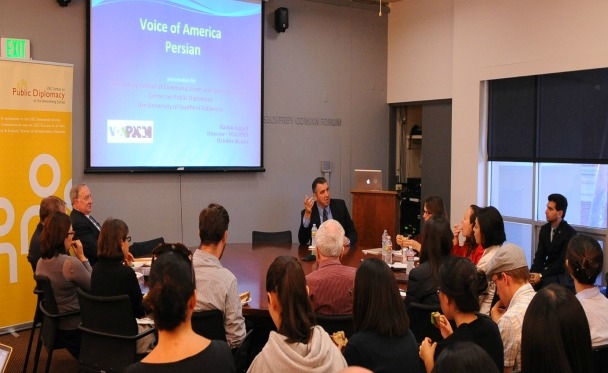
A Conversation with Ramin Asgard, Director of VOA’s Persian News Network
The USC Center on Public Diplomacy and USC Annenberg School of Journalism was pleased to host a discussion with Ramin Asgard, Director of Voice of America's Persian News Network.
Ramin addressed the challenges and successes of VOA's Persian News Network programming in the face of government hostility and obstruction. Specific examples included original content such as the news magazine show "Parazit", covering international issues, and the use of social media in messaging. Ramin went on to discuss how PNN handles conflicts between doing journalism and being part of the U.S. government.
Read the event synopsis below.
About Ramin Asgard
Ramin Asgard is currently the highest ranking Iranian American career Foreign Service Officer with the U.S. Department of State. He recently served as a Political Advisor to General David Petraeus and General James Mattis at the U.S. Central Command (CENTCOM) in Tampa, Florida. Prior to joining CENTCOM, Mr. Asgard served as Director of the Iran Regional Presence Office in Dubai, the U.S. Government's primary field operation concerning Iran.
Prior to joining the Department of State, Mr. Asgard practiced law in Pennsylvania and New Jersey. He received his J.D. degree from Tulane University, his M.A. in Political Science from the University of Pennsylvania, and his B.A., summa cum laude, from Temple University. He is a member of Phi Beta Kappa and the Council on Foreign Relations.
The Voice of America (VOA), which first went on the air in 1942, is an international multimedia broadcasting service funded by the U.S. government through the Broadcasting Board of Governors. The VOA broadcasts approximately 1,500 hours of news, information, educational, and cultural programming every week to an estimated worldwide audience of 123 million people.
SYNOPSIS
Heavy media censorship by the Iranian government poses great challenges to Voice of America’s Persian News Network’s (VOA) efforts to broadcast accurate, comprehensive, engaging and trustworthy news in Iran. This “Electronic Curtain,” as Ramin Asgard, director of VOA, named it is not a new development. It first appeared in the 1980’s after the Iranian government declared the press a propagator and promoter of Islamic Culture. Since then, censorship efforts have bordered on the extreme, with the government going as far as to try and create a “Halal Internet” by 2012. VOA is faced with the challenge of bypassing government efforts to control the flow of information while maintaining its democratic values by avoiding both restricting access to information and severing communication.
There are several options VOA has in breaching the “Electronic Curtain.” They can engage multilaterally and with private broadcasters, publicize the Iranian government’s unjust censorship of media, establish a linkage narrative between access to information and human rights, and raise the negative consequences to Iran of its continued negative conduct. However this proves difficult when Iran jams its satellites, making it difficult for foreign news organizations to broadcast in the country. Asgard stressed the importance of VOA’s preparation to play a key role as the wave of change sweeping the region hits Iran.
Visit CPD's Online Library
Explore CPD's vast online database featuring the latest books, articles, speeches and information on international organizations dedicated to public diplomacy.











